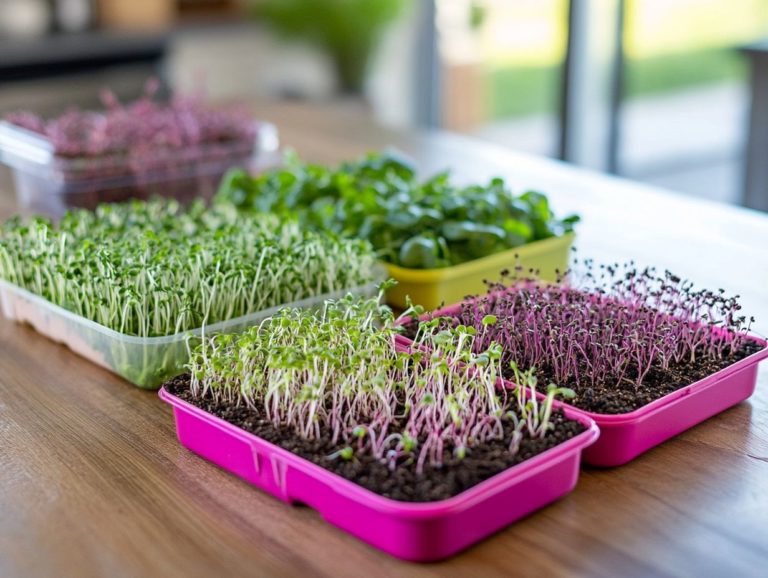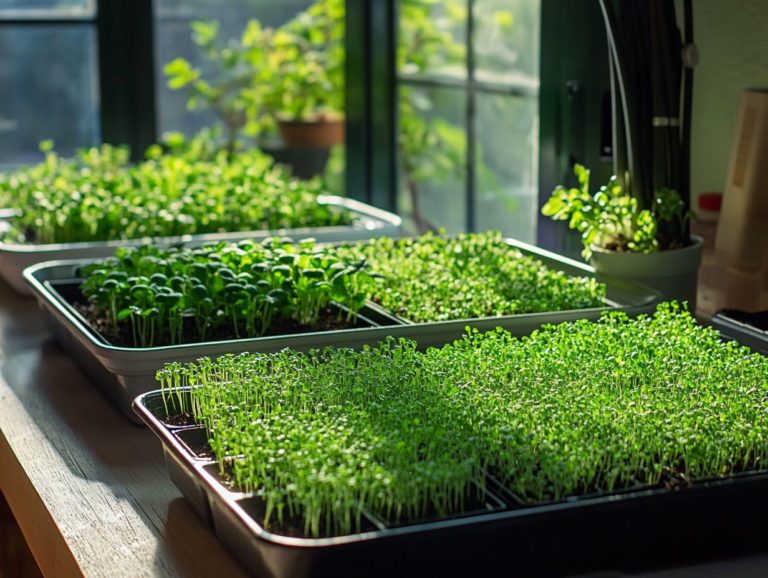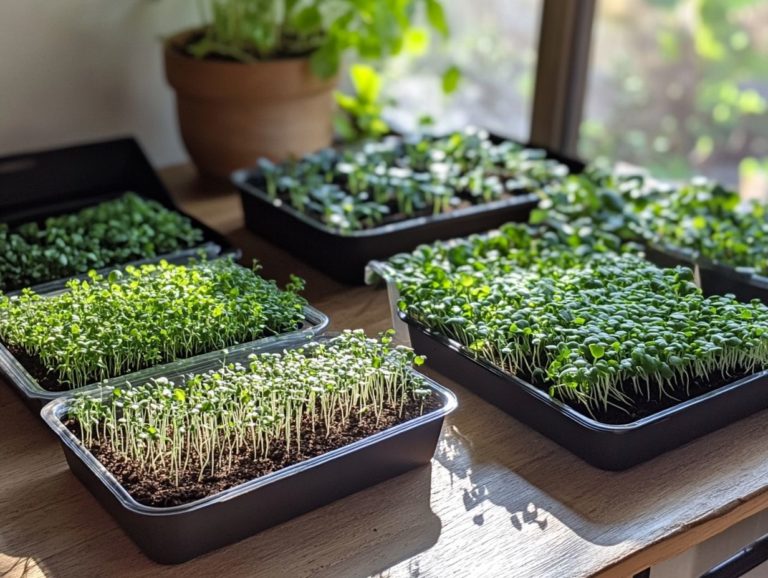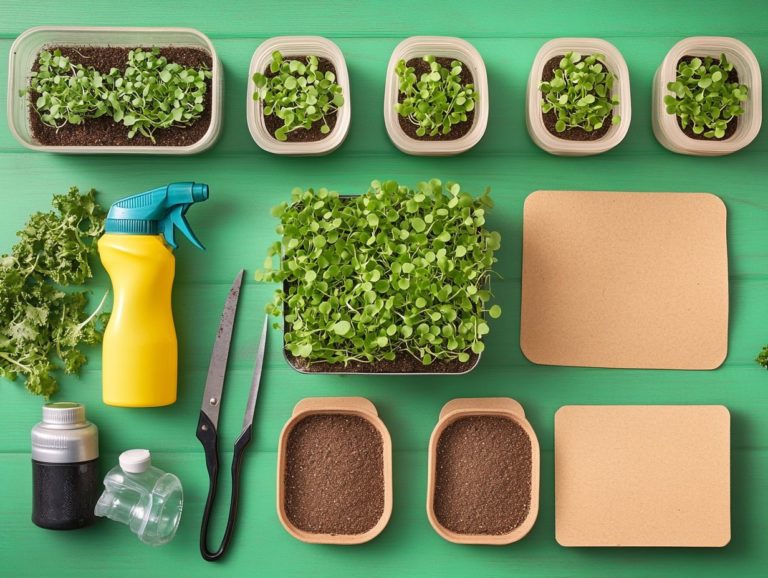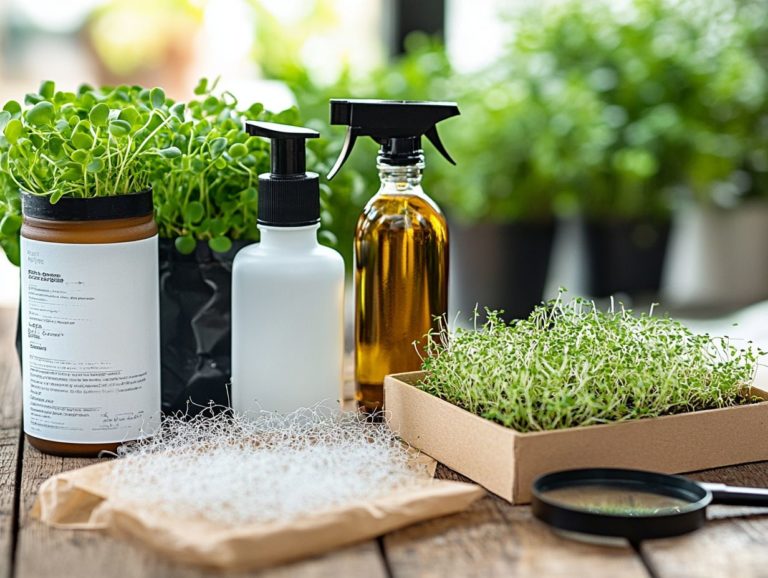5 Best Organic Fertilizers for Microgreens
Microgreens aren’t just a fashionable garnish for your dishes; they re a powerhouse of nutrients and flavor. This makes them a go-to choice for home gardeners looking to grow their own microgreens.
When it comes to nurturing these lively greens, selecting the right organic fertilizer, such as Hero Organic Plant Food or Pure Coconut Coir, is absolutely essential.
This article delves into five of the finest organic fertilizers that will give your microgreens the boost they truly deserve, including options like liquid fertilizer and compost.
From compost to seaweed fertilizer, you’ll discover their benefits, application methods, and even some DIY options to consider, such as using coir or Jiffy pellets.
You ll also find guidance on selecting the ideal fertilizer for your specific soil type and nutrient needs, along with potential risks to keep in mind.
Get ready to take your microgreen gardening to the next level with insights from expert microgreen websites and resources like the Home Microgreens Grow course.
Contents
- Key Takeaways:
- 1. Compost
- 2. Worm Castings
- 3. Fish Emulsion
- 4. Seaweed Fertilizer
- 5. Bone Meal
- How to Choose the Right Organic Fertilizer for Microgreens?
- What Are the Benefits of Using Organic Fertilizers for Microgreens?
- How to Properly Apply Organic Fertilizers to Microgreens?
- Can Organic Fertilizers Be Used for All Types of Microgreens?
- What Are the Potential Risks of Using Organic Fertilizers for Microgreens?
- Are There Any DIY Organic Fertilizer Options for Microgreens?
- Common Questions About Organic Fertilizers
- What are the top 5 best organic fertilizers for microgreens?
- Why is it important to use organic fertilizers for microgreens?
- How do fish emulsion and worm castings benefit microgreens?
- What are the benefits of using compost for microgreens?
- Can I make my own organic fertilizer for microgreens?
- Are there any specific organic fertilizers for specific types of microgreens?
Key Takeaways:
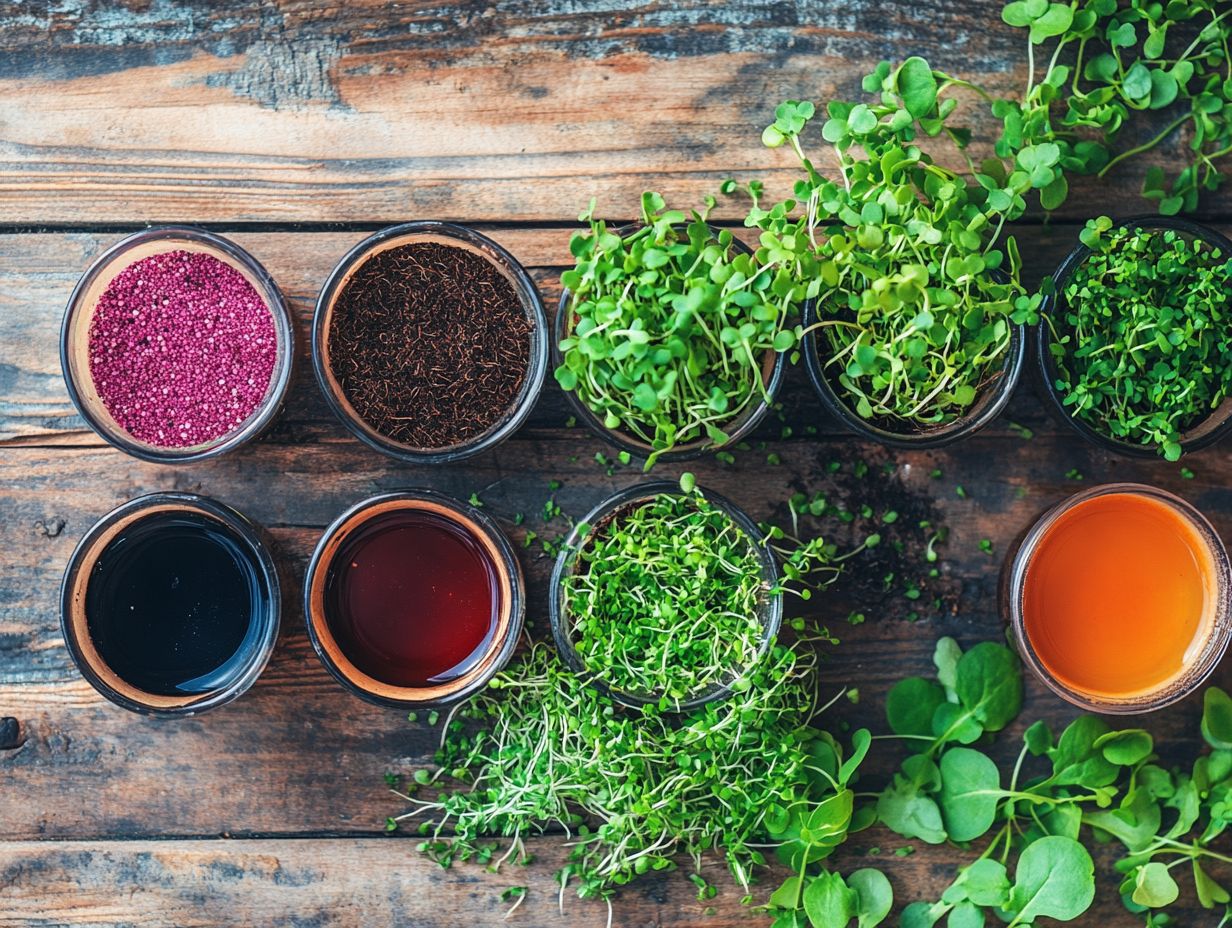
- Compost is a versatile and full of nutrients organic fertilizer that promotes healthy growth in microgreens, especially varieties like Purple Vienna Kohlrabi and Genovese Basil.
- Worm castings contain beneficial microorganisms and nutrients, making them a great choice for organic fertilization of microgreens. They enhance overall soil health.
- Fish emulsion is a natural and sustainable fertilizer option that provides essential nutrients for microgreens. It s a favorite among both novice and experienced gardeners.
1. Compost
Compost is an essential organic material, especially when it comes to cultivating a variety of microgreens. It enriches your soil with important nutrients and enhances soil structure, making it perfect for home gardeners and aspiring microgreen enthusiasts.
For example, using high-quality compost like Hero Organic Plant Food, Pure Coconut Coir, and Nature’s Lawn and Garden sets the stage for optimal growth conditions for microgreens like Purple Vienna Kohlrabi and Genovese Basil. Additionally, following the 5 best practices for harvesting microgreens champions sustainable gardening practices.
Compost improves nutrient availability and boosts microbial activity, creating a thriving soil ecosystem crucial for healthy root development. This lively environment leads to larger and more flavorful microgreens.
Products like Hero Organic Plant Food contribute additional nitrogen and trace minerals. Pure Coconut Coir enhances moisture retention, crafting the ideal blend for those delicate seeds.
When you grow popular microgreens in such enriched compost, you can expect increased germination rates, richer colors, and enhanced taste. Transitioning to homegrown greens becomes not just beneficial but incredibly rewarding.
2. Worm Castings
Worm castings are an exceptional organic fertilizer full of nutrients that can dramatically enhance the growth of your microgreens. They deliver essential elements like nitrogen, phosphorus, and potassium, all crucial for their development.
These castings also harbor beneficial microorganisms that cultivate a robust soil ecosystem. This promotes superior nutrient absorption necessary for growing microgreens effectively. When you blend them with other fertilizers like FloraGro and Azomite, you create a combination that elevates growth and vitality. FloraGro provides an optimal balance of macro and micronutrients, while Azomite delivers trace minerals vital for overall plant health.
For effective application, consider mixing worm castings into your Home Microgreens Potting Mix before sowing seeds. You can also create a liquid fertilizer by steeping the castings in water to use as a foliar spray. This ensures that your microgreens receive a balanced nutrient supply right from the start, establishing a solid foundation for growth.
Try these organic fertilizers today and watch your microgreens flourish!
3. Fish Emulsion
Fish emulsion is a highly effective liquid fertilizer for microgreens. It provides essential nutrients that encourage strong growth, making it popular among both amateur and professional gardeners.
This fertilizer is rich in nitrogen, phosphorus, and potassium. These elements support strong roots and vibrant leaves, resulting in healthier and more flavorful plants.
To maximize the benefits of fish emulsion, follow the recommended dilution ratios typically around 1:5 or 1:10. Use products like FloraGro or Azomite carefully to avoid overwhelming your delicate seedlings. Timing is key; applying it during the early and mid-growth stages will enhance nutrient uptake, helping your microgreens thrive and yield a bountiful harvest.
Integrating this application into your routine is easy, making fish emulsion an essential tool for successful microgreen cultivation.
4. Seaweed Fertilizer
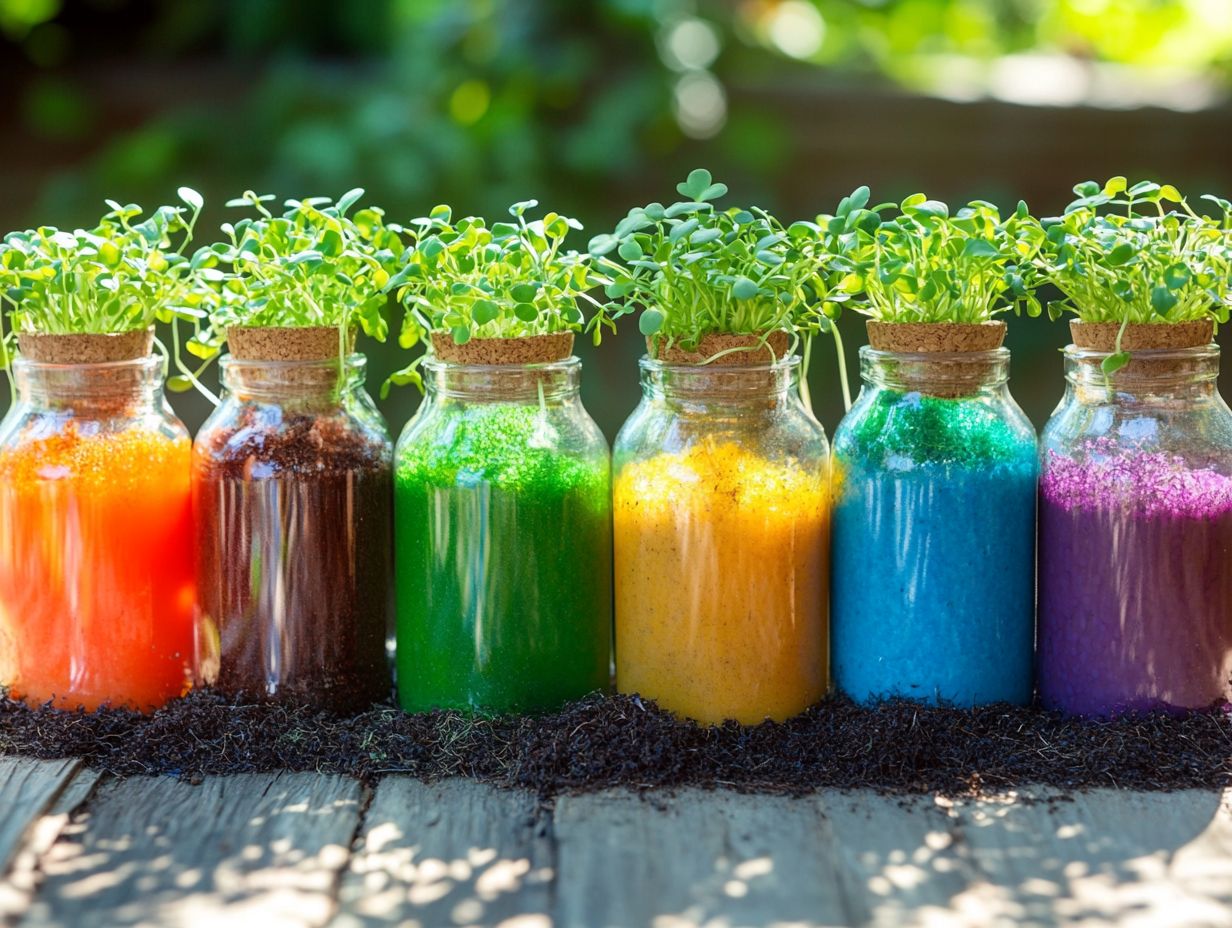
Seaweed fertilizer is an organic powerhouse for your microgreens. It boosts resilience and adds trace elements often lacking in synthetic options.
This oceanic treasure not only nourishes but also improves soil health by promoting the healthy movement of tiny organisms in the soil and enhancing moisture retention. When using products like Ocean Solution, you can easily enrich your growing medium with a balanced nutrient profile for vibrant microgreen production.
The natural growth stimulants in seaweed help your plants withstand stress, making them more robust.
By using seaweed fertilizer, you’re not just growing nutrient-dense greens; you’re also embracing a more sustainable and eco-friendly gardening practice.
5. Bone Meal
Bone meal is a slow-release fertilizer packed with phosphorus. It’s perfect for boosting young microgreens root growth, especially during their early development stages.
This crucial nutrient is vital for stimulating strong root systems, essential for the overall health of your microgreens. Thoughtful application of bone meal enhances nutrient uptake, allowing your plants to really flourish.
Combine bone meal with other fertilizers, like kelp meal or compost, to create a well-rounded nutrient profile. This approach meets the diverse needs of your plants and ensures a sustainable growth process. This synergy maximizes growth potential, leading to microgreens that are robust and bursting with flavor resulting in a bountiful harvest.
How to Choose the Right Organic Fertilizer for Microgreens?
To choose the right organic fertilizer, understand your soil type and what your plants need. This knowledge sets you up for success.
Analyze the unique characteristics of your soil, whether it s clay or sandy, and match them with the specific requirements of microgreen varieties like Purple Vienna Kohlrabi or Genovese Basil. This will help you make informed fertilization decisions and select reputable products from companies like True Leaf Market, which offers detailed nutrient profiles to assist in your selection process.
Consider both the immediate and long-term nutrient needs of these fast-growing microgreens. A balanced plant food is essential to promote healthy root development and robust growth, ultimately leading to a bountiful harvest you can take pride in. Incorporating microgreens that provide essential nutrients can enhance your gardening success.
What Are the Benefits of Using Organic Fertilizers for Microgreens?
Organic fertilizers offer a wealth of advantages for cultivating microgreens, including enhanced nutrient availability, improved soil structure, and a significantly reduced risk of chemical build-up, leading to healthier, more vibrant plants.
By incorporating natural materials like compost, bone meal, and fish emulsion, you promote the gradual release of essential nutrients that drive vigorous growth. Unlike synthetic fertilizers, which can lead to nutrient leaching and soil degradation over time, organic options actively nurture the soil ecosystem. This supercharges beneficial microorganisms that enrich plant nutrition, making them essential for sustainable gardening practices.
This dynamic interaction boosts both availability of large and small nutrients, fostering robust root systems. As a result, plants nurtured with organic fertilizers often display increased resilience against pests and diseases, paving the way for a more sustainable gardening approach.
How to Properly Apply Organic Fertilizers to Microgreens?
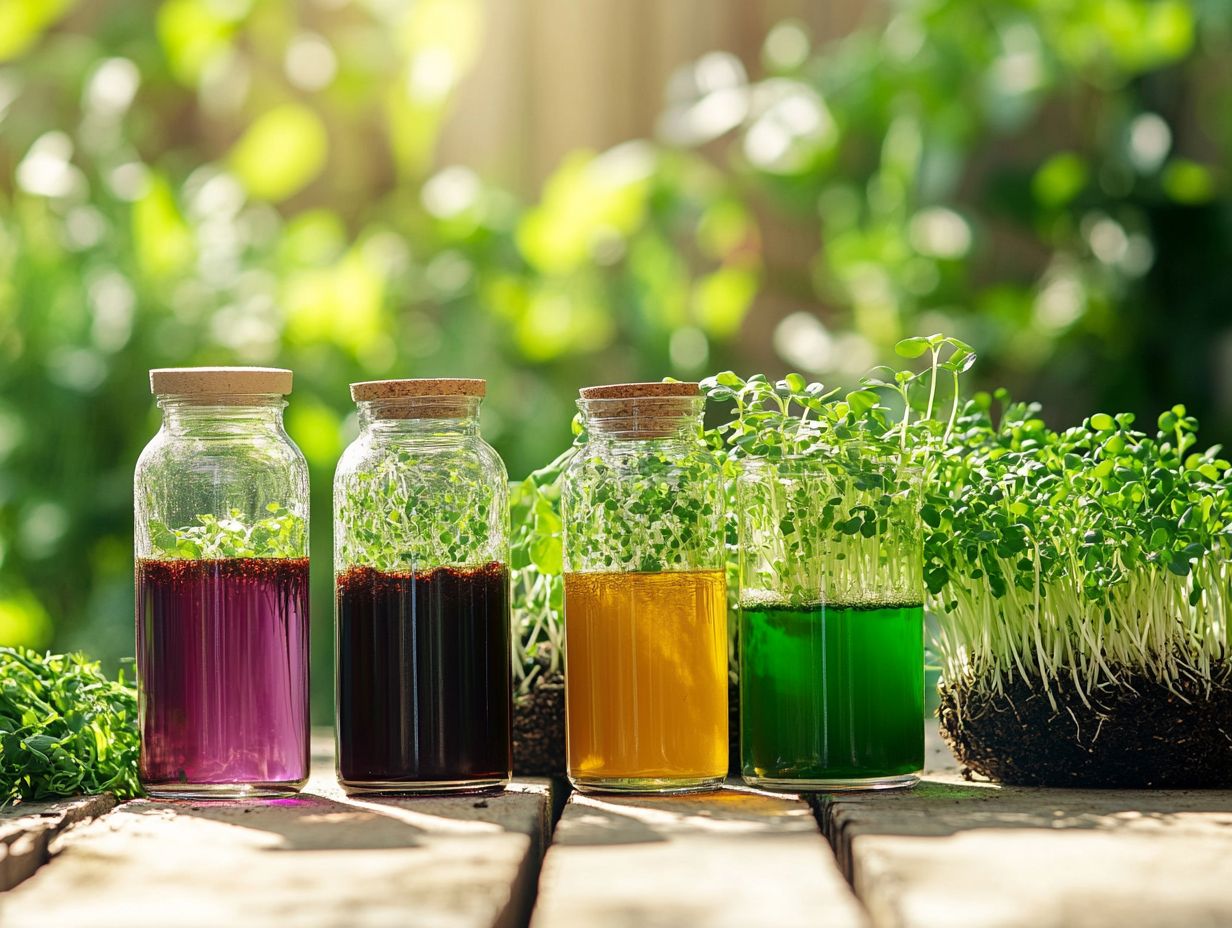
The proper application of organic fertilizers to your microgreens is vital for ensuring they receive the right nutrients at each growth stage. This can be achieved through methods tailored to your chosen growing medium, like HM Potting Mix.
You might consider mixing the fertilizers directly into the potting mix before planting, or using them as a liquid feed throughout the growing period. If you choose the mixing method, make sure to incorporate the organic matter evenly; this ensures your young plants have consistent access to essential nutrients.
Liquid applications allow for quick absorption, making them particularly effective during critical growth phases.
It s crucial to pay attention to both the timing of your applications typically during the seedling stage and just before harvest and the recommended quantities of microgreen fertilizer to optimize growth. Adjust the frequency based on the specific needs of your plants and growth conditions to enhance nutrient uptake.
Can Organic Fertilizers Be Used for All Types of Microgreens?
Organic fertilizers can be incredibly beneficial for your microgreens, but their effectiveness often hinges on your specific growing conditions and soil type. This means you ll need to adopt tailored approaches for different varieties.
Take sunflower microgreens, for instance. These nutrient-demanding beauties tend to flourish when provided with a balanced organic fertilizer rich in nitrogen, resulting in lush foliage and impressive growth. On the flip side, if you’re working with more nutrient-sensitive varieties like pea shoots, a lighter organic blend may be your best bet. Incorporating the 5 essential nutrients for microgreen growth allows for a delicate balance that won’t overwhelm the soil.
Don’t overlook compost tea, either. Packed with beneficial microorganisms, it’s a nutrient-rich liquid made from steeping compost in water. Compost tea serves as an excellent natural booster, particularly if you aim to cultivate nutrient-rich greens. By selecting the right fertilizer for each microgreen variety, you can elevate both flavor and yield, ultimately leading to a more rewarding harvest. For more insights, consider using natural fertilizers for microgreen growth.
What Are the Potential Risks of Using Organic Fertilizers for Microgreens?
Despite their many advantages, using organic fertilizers for microgreens comes with some risks that you should be aware of, such as nutrient imbalances or potential contamination that could negatively impact plant health if not carefully monitored.
These issues often stem from over-application, where excess nutrients leach into the soil, leading to uneven distribution and jeopardizing the growth of your seedlings. It s essential to consider the source of these organic products; low-quality or improperly processed fertilizers could introduce pathogens or harmful substances into your growing environment.
To minimize these risks, implementing a regular soil testing schedule is key for accurately assessing nutrient levels and adjusting your application as needed. By sourcing fertilizers from reputable suppliers and sticking to the recommended application rates, you can create a balanced and safe environment that allows your microgreens to thrive.
Start enriching your microgreens today with organic fertilizers and watch them thrive!
Are There Any DIY Organic Fertilizer Options for Microgreens?
Creating your own organic fertilizers for microgreens is rewarding and budget-friendly. You can craft mixes of nutrients tailored to your plants specific needs.
By choosing homemade solutions, you decrease your dependence on commercial products. You also tap into a wealth of readily available materials, like kitchen scraps and garden waste.
For instance, compost teas, which are liquid fertilizers made from compost, can supercharge your plants growth. Fermented plant juices harness natural enzymes found in various herbs to enhance nutrient absorption.
These methods boost soil health and foster a vibrant ecosystem. Transform your gardening experience into something truly special!
Get ready to embark on an exciting green journey, cultivating nutritious microgreens without straining your wallet.
Common Questions About Organic Fertilizers
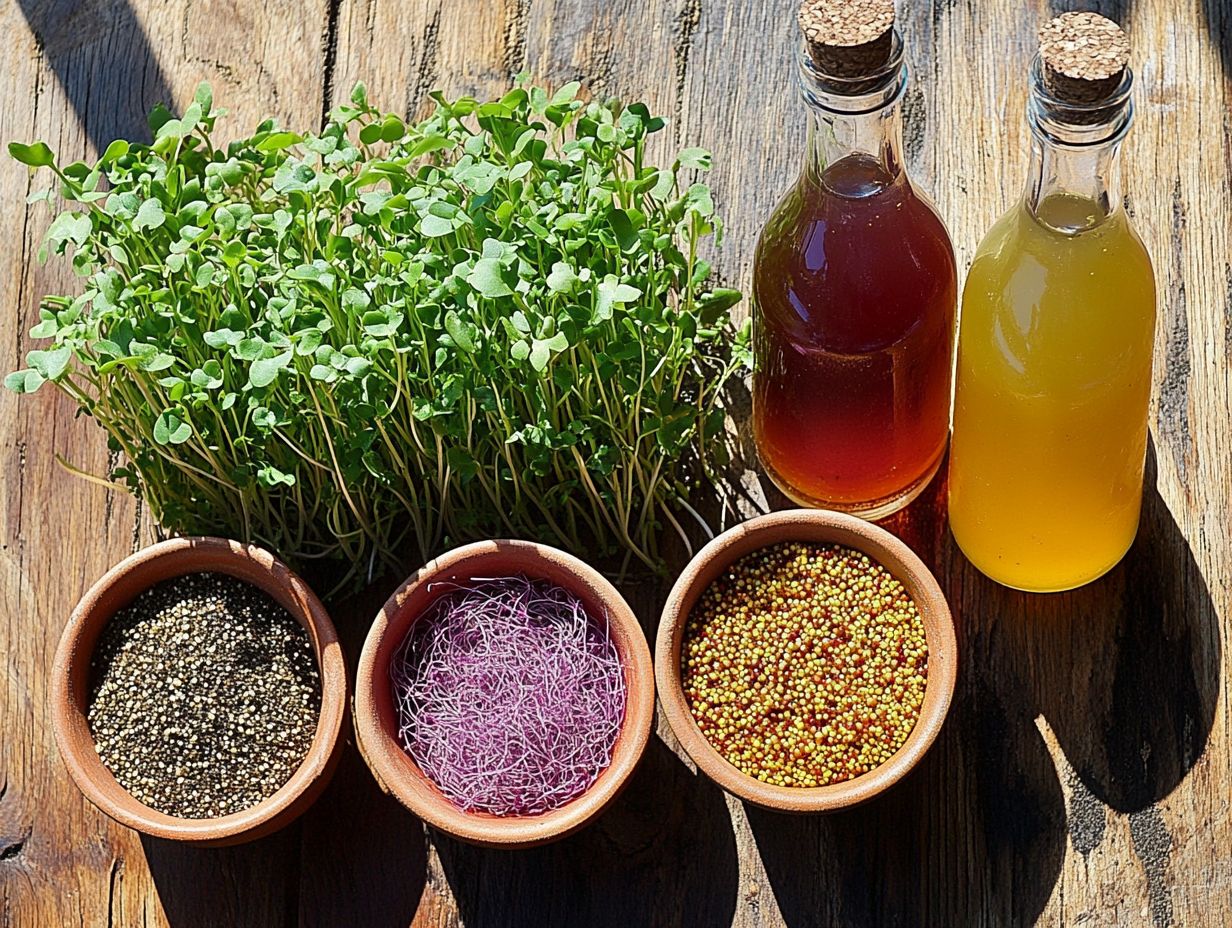
What are the top 5 best organic fertilizers for microgreens?
The top 5 organic fertilizers for microgreens are fish emulsion, worm castings, compost, seaweed extract, and kelp meal.
Why is it important to use organic fertilizers for microgreens?
Organic fertilizers provide essential nutrients to microgreens without harmful chemicals. This ensures that the microgreens are safe for consumption and better for the environment.
How do fish emulsion and worm castings benefit microgreens?
Fish emulsion is a liquid fertilizer made from fish waste and provides a balanced mix of nutrients for microgreens. Worm castings are rich in beneficial microorganisms that improve soil health and promote plant growth.
What are the benefits of using compost for microgreens?
Compost is a natural, nutrient-rich fertilizer that improves soil structure and retains moisture. It also provides essential nutrients for microgreens and helps reduce waste.
Can I make my own organic fertilizer for microgreens?
Yes, you can make your own organic fertilizer for microgreens by composting kitchen scraps or creating a worm bin. These methods are cost-effective and help reduce waste.
Are there any specific organic fertilizers for specific types of microgreens?
Some microgreens have specific nutrient requirements. It s important to choose an organic fertilizer that provides the necessary nutrients for your specific type of microgreens.
For example, kelp meal is high in potassium, which is beneficial for root growth in microgreens like radishes and carrots.

